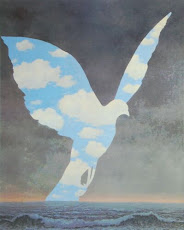Monday, March 29, 2010
summon me to shangri-la...
so i finished. secretly want to live in shangri-la forever. don't think it'll happen. the realist in me understands why it will never happen-but still REALLY wants to go to tibet now. let me know when you want to hear the rest of my soap box.
Monday, March 15, 2010
Trivia Pursuit
I want you all to know I thought of you last night. I was playing Trivial Pursuit with my family and the question was:
What James Hilton pocket-sized edition was first published in 1939?
I hope you all know the answer.
What James Hilton pocket-sized edition was first published in 1939?
I hope you all know the answer.
Tuesday, March 2, 2010
How we read ... a lit theory question ...

I was listening to a talk this morning by a rather inspiring Mormon Bibliophile, Sterling W. Sill. I sincerely adore that man. In fact, it's hard for me to explain just how much Brother Sill influenced my life growing up. His dozens of books introduced me to the world of literature as it can (and should) be ... and prompted me to begin delving into worlds I may never had entered without his help.*
In this talk, given at BYU over thirty years ago, Brother Sill talks about the common link between "Bottle and Books." He begins by discussing two famines mentioned by Amos: (1) a famine of bread and a thirst for water and (2) a famine for hearing the word of God.
Bottles, Brother Sill explains, were invented shortly after the turn of the nineteenth century in France and allowed humanity to, largely, mitigate the problems associated with the first type of famine. Similarly, books have allowed us to capture the thoughts of the greatest thinkers the world has known and preserve them for future generations.
As Brother Sill explained:
This, of course, we all agree with. We are, after all, Bibliophiles in name, word, and deed. We understand the why of reading.Without books, God is silent, justice dormant, philosophy lame.
John Milton said, "Books are not . . . dead things, but do contain a potency of life in them to be as active as that soul was whose progeny they are; nay they do preserve as in a vial the purest efficacy . . . of that living intellect that bred them."
But later on in his talk, Brother Sill hit on a topic that I've always considered just as fascinating: The how of reading.
While discussing King Henry's famous St. Cripin's Day speech in Henry V, Brother Sill prefaced a quotation from the play with the following observation:
That is, this is Shakespeare edited by Brother Sill. When Shakespeare does not say it as I think he ought to, I just cross off what he said and write it in as I think he should have said it. I do not read Shakespeare to please Shakespeare; I read Shakespeare to please me, and if he does not say it to please me I change it so that it does.Now, a lot of book lovers would cry "BLASPHEMY!" to hear something like that. But is it?
It's been a long time since I've discussed any lit theory, but I initially tend to agree with Brother Sill. After all, we read books largely for our own benefit, understanding, and edification ... so why shouldn't we have the right create the story, words, or worlds that books offer "in our own image," as it were?
I guess one response is that, if we simply shut out those parts of the story that we don't like, we are missing on a key opportunity to expand our vision and experience a world we may never have dreamed of, i.e., the world the author is trying to show us.
So, with those preliminary thoughts in mind, my question for all of you is:
As readers, how much stock should we put in the author's purpose or intent as opposed to our own (I know there are names for each style of reading, but I can't seem to remember them at the moment)?
* NOTE: If you have the opportunity, you really must read some of his books. Many are available for $1-2 at Deseret Industries (if you have one near you ... lucky Utah people). If not, try Amazon.
New Book: Part II
Good afternoon my friends ... I'm sorry for the recent delay in my Bibliophile posting, but I'm happy to say I'm back on the horse and ready to (finally) help us choose a book to read by April 15.
From the initial poll (which, sadly, had only three participants), we've narrowed the choice to "Blindness" by Jose Saramago and "Lost Horizon" by James Hilton. The new poll (that I just put up) reflects these choices (with one vote allowed per person).
Let's have our votes in by Saturday and we can start next Monday.
From the initial poll (which, sadly, had only three participants), we've narrowed the choice to "Blindness" by Jose Saramago and "Lost Horizon" by James Hilton. The new poll (that I just put up) reflects these choices (with one vote allowed per person).
Let's have our votes in by Saturday and we can start next Monday.
Subscribe to:
Comments (Atom)
